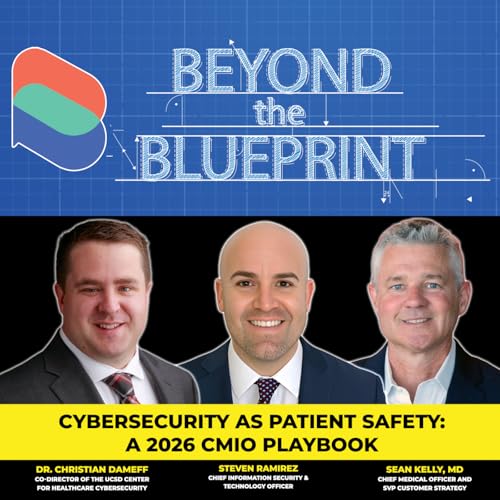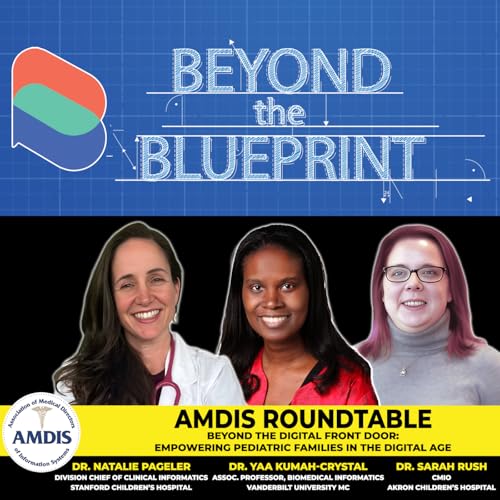What happens when pilots become more than experiments? In this AMDIS collaboration, Dr. Eve Cunningham (Cadence, formerly Providence), Kaitlyn Torrence (WellSpan, formerly MUSC), and Dr. Camille Bradley (Baylor Scott & White) reveal what separates failed pilots from scalable innovation. Drawing on real-world deployments of virtual care, ambient listening, and decision support tools, this episode dives deep into the operational, cultural, and clinical realities behind adoption. From rebranding "pilots" to building internal trust, the panel offers a blueprint for moving from spark to scale in health system innovation.
Together, they explore why scaling digital care requires more than good tech—it demands strong partnerships, clinician champions, and a relentless focus on solving real problems.
Key Takeaways -
Most pilots fail because they aren't designed for scale—think phased deployment, not one-off testing.
-
Rebranding "pilots" as experiments or phase-one initiatives improves credibility and staff buy-in.
-
Clinician champions ("entrepreneurial weirdos") are key to real-world feedback and viral adoption.
-
Operational leaders help navigate workflows, align stakeholders, and ensure accountability at scale.
-
Innovation labs must be tied to informatics and operational realities—not siloed showcases.
-
Health systems need platform partners, not point solutions, to meet long-term strategic goals.
-
Trust, process clarity, and iterative design drive clinical adoption—especially post-EMR trauma.
-
Change management resources are essential; adoption is emotional, not just technical.
-
Prioritization must follow clear goals (e.g., "cut 400,000 admin hours"), not shiny tech trends.
-
Vendors succeed when they understand the system's priorities—and show up ready to co-develop.
Episode Highlights 00:00 | Why So Many Pilots Fail
01:14 | Meet the Leaders Scaling Innovation
02:30 | The Pilot Graveyard: When Good Ideas Die
04:17 | Rebranding Pilots as Experiments
06:08 | Finding Your "Weirdos": The Power of Clinical Champions
07:56 | Designing for Process, Not Just Technology
09:34 | Defining the Problem Before Testing a Solution
10:23 | From Frustration to Trust: Winning Clinician Buy-In
12:14 | How Ambient Scribes Went Viral
13:58 | Socializing Tools with Frontline Feedback
15:27 | Why Operational Champions Matter
17:00 | The Role of Communication in Scaling
18:20 | Are Innovation Labs Working—or Just Expensive Showrooms?
20:37 | Partnerships Over Products: Building the Right Ecosystem
22:37 | Creating Safe Spaces to Fail and Pivot
24:10 | Aligning IT, Clinical, and Finance Around a North Star
26:00 | Strategic Prioritization: What Moves Forward and Why
27:44 | Attacking Admin Waste with AI and Clear Goals
29:34 | From Point Solutions to Platform Partners
31:11 | Vendor Advice: Do Your Homework, Bring Specific Value
33:20 | Three Takeaways for Innovation Leaders
Guests: Dr. Eve Cunningham, Dr. Camille Bradley, Kaitlyn Torrence
Host: Gregg Malkary - Spyglass Consulting Group
Cohost: Keith Washington - Companions in Courage Foundation
Sponsored by: Simplifi Medical & Storage Systems Unlimited
Audio/Video: Tim Jones - Health Nuts Media
Marketing: Josh Troop - Troop-Creative
Learn More at: www.beyond-blueprint.com
 34 分
34 分 37 分
37 分 39 分
39 分 40 分
40 分 2025/12/2936 分
2025/12/2936 分 2025/12/1336 分
2025/12/1336 分 35 分
35 分 40 分
40 分
